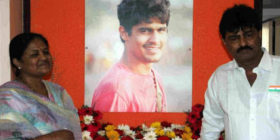Riding a sleek black Harley-Davidson motorbike and wearing a smart jacket and biking gloves, 27-year-old Arjun Bafna looks every bit the wealthy young man that he is. He comes from a family that owns one of India’s oldest and biggest automobile dealerships.
He has taken the business one step forward though. Arjun runs Seven Islands Harley-Davidson, the only Harley-Davidson franchise in Mumbai.
“I love automobiles, it’s my passion, because I’ve been brought up around cars and bikes all my life,” he says.
“I just kept on thinking that I don’t want to be a person who has a family lineage, but want to make a mark of their own.”
Arjun graduated five years ago and has opened a company each year.
 Arjan Bafna was aiming to be a billionaire by the time he was 30
Arjan Bafna was aiming to be a billionaire by the time he was 30
Apart from the motorbike showroom, he runs a logistics company, a travel firm and even a small business that helps you customise your vehicle’s look.
But it has not all been smooth sailing. Arjun had to close down a chartered airline business because he could not afford it, and while he is ambitious, he is also aware that things do not always goes to plan.
“Last year, when the economy was better, I was aiming to be in the billionaire club by 30 but that’s going to push to 32 now, because of the whole last year going not very good,” Arjun says. “You never know though, there are still three years left, right?”
Make or break in Mumbai India’s billionaire count is expected to double in the next 10 years, according to Knight Frank’s annual Wealth Report, and Mumbai is the city that is drawing people who want to make their fortune.

In a list of cities ranked by how many billionaires live in them, Mumbai features among the top 10 in the world.
But it is a city of contrasts. It is also where many of India’s poorest people live.
Tall, luxury apartment blocks overlook sprawling slums. Swanky air-conditioned sedans get stuck in traffic alongside buses that often have people spilling out of them.
 (Slums and luxury hotels exist side by side in Mumbai)
(Slums and luxury hotels exist side by side in Mumbai)
It is a hard place to live in, yet no matter who you speak to here, you find optimism and ambition. Everywhere you see people aspiring to make more money and to live a better life.
Not everybody makes it, but most believe that what sets Mumbai apart from other places in the country is that it will at least give you a chance to try.
‘Awesome’ journey
Thirty-nine-year-old Sudheer Nair grabbed that chance with both hands and has never looked back.
Twenty-five years ago he was a cargo loader at the Mumbai airport earning less than $2 (£1.18) a day. Today he runs eresource Infotech, an IT company that employs 140 people and is worth more than $1m.
 Sudheer Nair has gone from cargo loader to tech entrepreneur
Sudheer Nair has gone from cargo loader to tech entrepreneur
“It’s been an awesome journey,” Sudheer says. “There are so many lessons that I’ve learnt.”
Sudheer had to quit school in the ninth grade because his family could not afford it, but he taught himself how to write computer code.
As India opened up to the world in the early 1990s, he found a flood of opportunities coming his way.
In the past two decades, Sudheer has had the chance to live in other parts of the world, but it is Mumbai where he finally decided to start his own business.
“Mumbai is the most happening city,” he says.
“People in Mumbai, they have this very open mind. They’re open to ideas. They’re open to technology. They understand the importance of having technology for business growth. That’s the reason why I’m here, because there’s an acceptance.”
Starting young
 Chirag Dodiya, 19, runs six businesses while studying
Chirag Dodiya, 19, runs six businesses while studying
It is this exposure to technology that got Chirag Dodiya to set up his first company when he was just 16, providing software solutions to local businessmen.
“I got my first computer when I was 15. My sister gave it to me as a birthday gift. So it was something awesome. I discovered a new world, a new world called the internet,” Chirag says.
“First, like every kid does, I played games and had fun but I got bored actually. So then I started searching about how to make money.”
At 19, Chirag is still to graduate, but he already runs six ventures, most of them internet-based.
“If you find a great idea in India right now, there’s amazing potential,” he says. “And because of the number of people in India, it might grow a lot faster than what anyone has ever seen in New York or Silicon Valley or anywhere.”
It is a view that Arjun shares.
“If you start something in Mumbai and market it properly, it will 100% sell,” he says. “For the next five years I see that nothing can hold India back.”
This confidence has come with the country’s rapid economic rise over the past decade, and even though growth has slowed over the past couple of years, people like Arjun and Chirag believe that India still has miles to go, and that means plenty of opportunities for young people like them.






Leave a reply